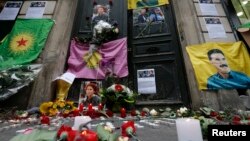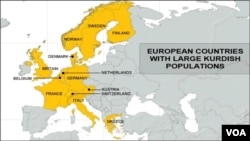PARIS/ISTANBUL —
The Turkish government and Kurdish rebels traded accusations on Friday about who is behind the assassinations of three Kurdish activists in Paris. Each suggests hardliners on the other side may have had a hand in Thursday's murders.
Prime Minister Recep Tayyip Erdogan said the shooting was most likely the result of an internal feud among the Kurds, noting that the building required an access code to unlock the door.
"Those three people opened the door," he said. "No doubt they wouldn't open it to people they didn't know."
Turkish officials said the slayings also could be aimed at derailing peace talks between Ankara and the PKK's jailed leader, Abdullah Ocalan. The PKK has been fighting for greater autonomy in Turkey for nearly three decades.
Kurds blame Turks
Kurdish politicians in Turkey disputed claims of an internal feud among Kurds. Aysel Tugluk, a pro-Kurdish member of parliament, pointed the finger at elements within the Turkish state
"Whenever we, Kurds and Turks, start to talk, similar provocations come forward and aim to prevent the process to go ahead," she said, "My personal belief is that there are still deep state forces in Turkey and this looks like an operation to sabotage the peace process."
Sakine Cansiz
Fidan Dogan
Leyla Soylemez
The “deep state” is a phrase often used in Turkey for rogue elements of the state with strong nationalist tendencies.
Songul Karabulut, executive committee member of the Brussels-based Kurdistan National Congress, said such professional killings could only have been authored by an important organization - perhaps a shadowy militia group with ties to the Turkish state.
Karabulut called the deaths a provocation by those who don't want the Kurdish problem resolved. It comes at a time of turmoil in Kurdish regions of Turkey, Syria, Iran and Iran, she said.
Murder probe begins
Police in France say they have opened a murder investigation.
Those killed include Sakine Cansiz, a senior member of the militant Kurdistan Workers Party, or PKK. She reportedly was headed the PKK's women's movement in Europe. The two others apparently worked as lobbyists and liaisons for the Kurdish cause in Europe.
In downtown Paris, drivers slowed down to stare at a small crowd gathered on the sidewalk of Rue Lafayette. Police barricaded the entrance of number 147, where the three were slain inside an information center.
Mamon Arikan was among those paying their respects on a cold, grey morning.
"We start to come to Paris in order to give all the enemies of the Kurdish people the message that we will not stop fighting for our freedom and our independence," Arikan said. "And we are not afraid of anybody. If they are killing us, we will not [be victimized]."
At the Kurdistan Arts and Culture Academy, about a 15-minute walk away from the shootings, hundreds of people gathered to commiserate and watch the latest news on Turkish TV. The academy's president, Murat Polat, denounced the killings as an act of cowardice.
Polat said he hopes the French government not only will find the killers quickly, but also those who ordered the assassinations.
Kurds in Europe
Kurds are relative newcomers to Western Europe. Many came here as immigrant workers in the 1960s and '70s. Germany and France have two of the largest Kurdish communities.
This is not the first time a Kurdish opposition leader has been killed in Europe. The head of the Democratic Party of Kurdistan was murdered in Vienna more than two decades ago. Authorities have yet to find the assassins.
Polat said that each time the Kurdish community is attacked, it rises up even stronger. Kurds like himself, he said, gather courage because they believe their fight is just.
Labelled a terrorist group by the United States and European Union, the PKK has waged a three-decade fight against Turkey for greater autonomy that resulted in the deaths of 40,000 people. Its cause has gathered much support within the Kurdish community in Turkey and among the diaspora.
Kurds have been staging demonstrations across Europe to protest the Paris killings. Another is planned for Saturday in Paris.
Prime Minister Recep Tayyip Erdogan said the shooting was most likely the result of an internal feud among the Kurds, noting that the building required an access code to unlock the door.
"Those three people opened the door," he said. "No doubt they wouldn't open it to people they didn't know."
Turkish officials said the slayings also could be aimed at derailing peace talks between Ankara and the PKK's jailed leader, Abdullah Ocalan. The PKK has been fighting for greater autonomy in Turkey for nearly three decades.
Kurds blame Turks
Kurdish politicians in Turkey disputed claims of an internal feud among Kurds. Aysel Tugluk, a pro-Kurdish member of parliament, pointed the finger at elements within the Turkish state
"Whenever we, Kurds and Turks, start to talk, similar provocations come forward and aim to prevent the process to go ahead," she said, "My personal belief is that there are still deep state forces in Turkey and this looks like an operation to sabotage the peace process."
Kurdish Shooting Victims in France
Kurdish Shooting Victims in FranceSakine Cansiz
- Founding member of Kurdistan Workers Party, or PKK
- Former PKK guerrilla
- Jailed in Turkey from 1978-1991, reportedly subjected to torture
- Helped lead PKK efforts to secure financial, political support from Europe's Kurdish exile community
Fidan Dogan
- Head of the Information Center for Kurdistan in Paris
- French representative of Brussels-based Kurdistan National Congress
- Raised in France
Leyla Soylemez
- Young Kurdish activist working in Paris.
Songul Karabulut, executive committee member of the Brussels-based Kurdistan National Congress, said such professional killings could only have been authored by an important organization - perhaps a shadowy militia group with ties to the Turkish state.
Karabulut called the deaths a provocation by those who don't want the Kurdish problem resolved. It comes at a time of turmoil in Kurdish regions of Turkey, Syria, Iran and Iran, she said.
Murder probe begins
Police in France say they have opened a murder investigation.
Those killed include Sakine Cansiz, a senior member of the militant Kurdistan Workers Party, or PKK. She reportedly was headed the PKK's women's movement in Europe. The two others apparently worked as lobbyists and liaisons for the Kurdish cause in Europe.
In downtown Paris, drivers slowed down to stare at a small crowd gathered on the sidewalk of Rue Lafayette. Police barricaded the entrance of number 147, where the three were slain inside an information center.
Mamon Arikan was among those paying their respects on a cold, grey morning.
"We start to come to Paris in order to give all the enemies of the Kurdish people the message that we will not stop fighting for our freedom and our independence," Arikan said. "And we are not afraid of anybody. If they are killing us, we will not [be victimized]."
At the Kurdistan Arts and Culture Academy, about a 15-minute walk away from the shootings, hundreds of people gathered to commiserate and watch the latest news on Turkish TV. The academy's president, Murat Polat, denounced the killings as an act of cowardice.
Polat said he hopes the French government not only will find the killers quickly, but also those who ordered the assassinations.
Kurds in Europe
Kurds are relative newcomers to Western Europe. Many came here as immigrant workers in the 1960s and '70s. Germany and France have two of the largest Kurdish communities.
This is not the first time a Kurdish opposition leader has been killed in Europe. The head of the Democratic Party of Kurdistan was murdered in Vienna more than two decades ago. Authorities have yet to find the assassins.
Polat said that each time the Kurdish community is attacked, it rises up even stronger. Kurds like himself, he said, gather courage because they believe their fight is just.
Labelled a terrorist group by the United States and European Union, the PKK has waged a three-decade fight against Turkey for greater autonomy that resulted in the deaths of 40,000 people. Its cause has gathered much support within the Kurdish community in Turkey and among the diaspora.
Kurds have been staging demonstrations across Europe to protest the Paris killings. Another is planned for Saturday in Paris.






